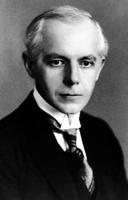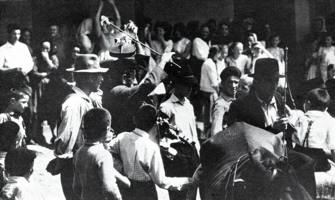
|
The Society of Folk Dance Historians (SFDH)
Béla Bartók
[
Home |
About |
Encyclopedia | CLICK AN IMAGE TO ENLARGE |

|

 For Béla Bartók, the sources of music were in the folk. He learned from them, and retained their spirit while he translated their expression into a sophisticated language of musical composition for the concert hall.
For Béla Bartók, the sources of music were in the folk. He learned from them, and retained their spirit while he translated their expression into a sophisticated language of musical composition for the concert hall.
Famous as a pianist and composer as well as a dedicated teacher at the Academy, Bartók still made one of the chief contributions to knowledge of Eastern European folk music and dance. Together with Zoltán Kodály, as well as by himself, he made numerous expeditions to widely separated areas of Hungary (from Transdanubia in the west to Transylvania in the east) and to neighboring countries of the Balkan region. He and Kodály first published a collection of arrangements of folksong entitled Twenty Hungarian Folksongs, in which each contributed ten arrangements. In the preface they indicated that their research aimed at ethnological research for origins of their culture, and also at bringing the music to the people for their enjoyment and performance.
To collect the material, Bartók used an Edison phonograph that made possible the preservation of every nuance on wax cylinders. For thirty years he amassed a collection of folk music, often risking his life, for his health was poor. In 1934, he finally took pause in his busy teaching and concertizing career and became a member of the Hungarian Academy of Science, to devote his full attention to systematizing the collection. Suddenly, he was stimulated to look for the origins of Magyar peasant music by making a journey to Turkey. He worked there in the villages and with nomadic tribes. His findings have not been published, but sixty-six of the collected melodies are in the Columbia University library, with his essay of introduction.
Bartók's publications on Hungarian-Romanian music include may articles. The musical portion is considerable, for in addition to arranging the music he collected, the folk techniques permeate his own composition. In his music one finds modal tones strange to Western ears, unpredictable and vitally-alive rhythms and irregular meters, sonorities ranging from the barbarous to the highly sophisticated and subtle. And for the performer, his music ranges from the simplest settings of folk tunes to the most demanding of digital virtuosity.
His ethnological musical publications are:
- Twenty Hungarian Folksongs, for voice and piano
- The Folk Music of the Arabs of Biskra and Its Neighbors
- Cantece Populare Romanesti din Comitatul Bihor
- The Melodies of Hungarian Soldier Songs
- The Folk Music of the Rumanians of Maramureș
- The Hungarian Folk Song
- Folk Music of Hungary's Neighbors
- The Melodies of the Rumanian Colinde
Some of his own compositions that openly owe their existence to his research are:
- Two Rumanian Dances, for piano
- Four Old Hungarian Folksongs, for men's chorus
- Fifteen Hungarian Peasant Songs, for piano
- Rumanian Christmas Songs from Colinde, for piano
- Slovakian Folksong, for mixed chorus and piano
- Rumanian Folk Dances, for chamber orchestra
It is one of the tragedies of the 20th century that poor health, severe losses due to war, and personal misfortune finally culminated in a pauper's death in the United States. Béla Bartók had come to the United States to accept an assistantship in music at Columbia University for $3,000.00 for the year 1941-42. From that time until his death in 1945 he accepted positions in various parts of the States, but at the same time his expenses mounted beyond his capacity to pay, for he had frequent long hospitalizations. At various times, musician friends took up collections or commissioned works to pay his debts.
He died without knowing success in the United States. If only he could have lived a little longer to see how finally his music was not only accepted, but was widely applauded and much in demand, as it is today. But, of course, musicians and music audiences today do not feel that his work was in vain. They have received a rich legacy of music, and have arrived at a feeling of closeness to Hungarian-Romanian folk culture.
DOCUMENTS
- Balkans, a region.
Used with permission of the
Center for Traditional Music and Dance Archive, www.ctmd.org.
Printed in Mid-Hudson Valley Fall Folk Festival 1973 at New Paltz.
This page © 2018 by Ron Houston.
Please do not copy any part of this page without including this copyright notice.
Please do not copy small portions out of context.
Please do not copy large portions without permission from Ron Houston.